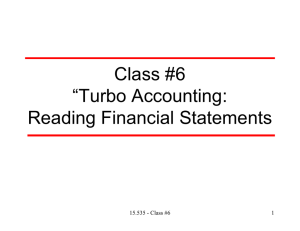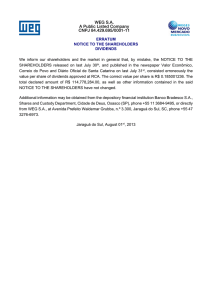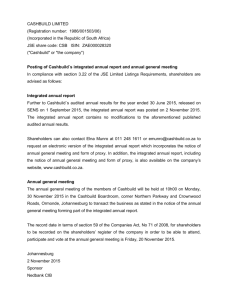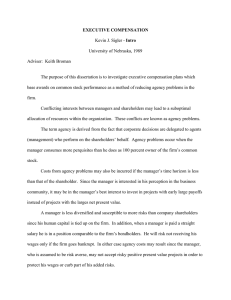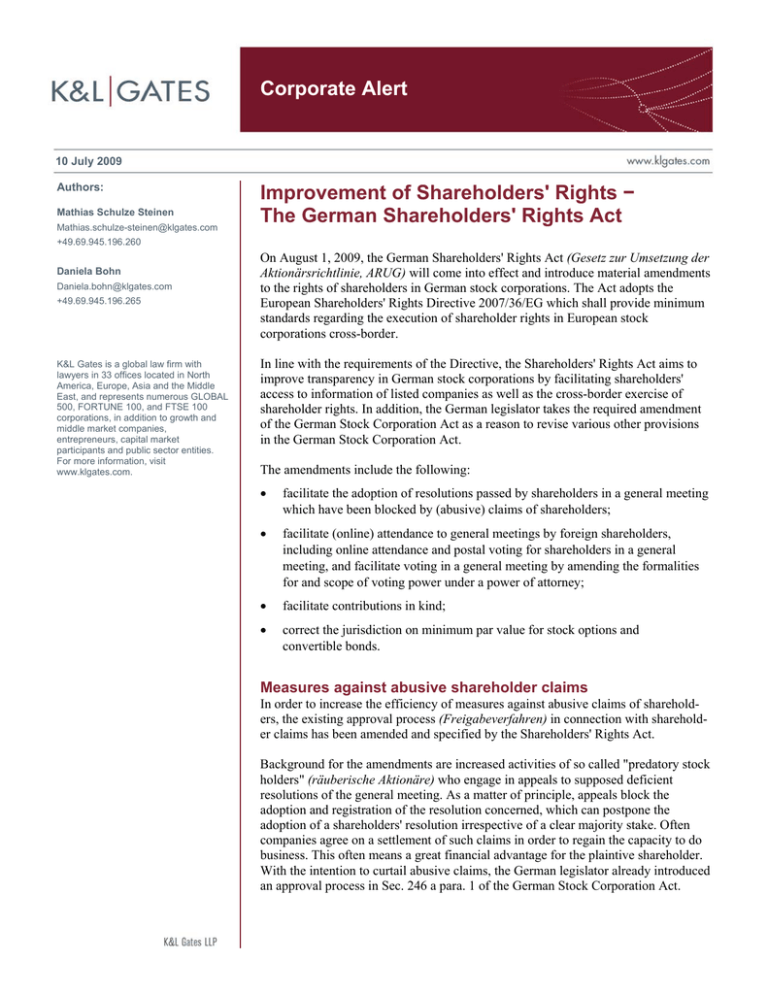
Corporate Alert
10 July 2009
Authors:
Mathias Schulze Steinen
Mathias.schulze-steinen@klgates.com
Improvement of Shareholders' Rights −
The German Shareholders' Rights Act
+49.69.945.196.260
Daniela Bohn
Daniela.bohn@klgates.com
+49.69.945.196.265
K&L Gates is a global law firm with
lawyers in 33 offices located in North
America, Europe, Asia and the Middle
East, and represents numerous GLOBAL
500, FORTUNE 100, and FTSE 100
corporations, in addition to growth and
middle market companies,
entrepreneurs, capital market
participants and public sector entities.
For more information, visit
www.klgates.com.
On August 1, 2009, the German Shareholders' Rights Act (Gesetz zur Umsetzung der
Aktionärsrichtlinie, ARUG) will come into effect and introduce material amendments
to the rights of shareholders in German stock corporations. The Act adopts the
European Shareholders' Rights Directive 2007/36/EG which shall provide minimum
standards regarding the execution of shareholder rights in European stock
corporations cross-border.
In line with the requirements of the Directive, the Shareholders' Rights Act aims to
improve transparency in German stock corporations by facilitating shareholders'
access to information of listed companies as well as the cross-border exercise of
shareholder rights. In addition, the German legislator takes the required amendment
of the German Stock Corporation Act as a reason to revise various other provisions
in the German Stock Corporation Act.
The amendments include the following:
•
facilitate the adoption of resolutions passed by shareholders in a general meeting
which have been blocked by (abusive) claims of shareholders;
•
facilitate (online) attendance to general meetings by foreign shareholders,
including online attendance and postal voting for shareholders in a general
meeting, and facilitate voting in a general meeting by amending the formalities
for and scope of voting power under a power of attorney;
•
facilitate contributions in kind;
•
correct the jurisdiction on minimum par value for stock options and
convertible bonds.
Measures against abusive shareholder claims
In order to increase the efficiency of measures against abusive claims of shareholders, the existing approval process (Freigabeverfahren) in connection with shareholder claims has been amended and specified by the Shareholders' Rights Act.
Background for the amendments are increased activities of so called "predatory stock
holders" (räuberische Aktionäre) who engage in appeals to supposed deficient
resolutions of the general meeting. As a matter of principle, appeals block the
adoption and registration of the resolution concerned, which can postpone the
adoption of a shareholders' resolution irrespective of a clear majority stake. Often
companies agree on a settlement of such claims in order to regain the capacity to do
business. This often means a great financial advantage for the plaintive shareholder.
With the intention to curtail abusive claims, the German legislator already introduced
an approval process in Sec. 246 a para. 1 of the German Stock Corporation Act.
Corporate Alert
The already existing approval process allows the
court to approve the adoption of the resolution and
registration with the commercial register, provided
that the claim does not oppose the adoption, i.e.
interests of the company are deemed to override the
interests of the shareholder. It turned out, however,
that the existing approval process is not a practical
solution since proceedings last up to 9 months
or longer.
The new law provides the court with a more precise
basis for its decisions in the approval process by
defining criteria for abusive claims:
•
the claim of a shareholder is inadmissible or
obviously unsubstantial;
•
the share of the plaintiff is or falls below EUR
1,000 in total; or
•
the effectiveness of the resolution in a general
meeting takes precedence over the claim of the
shareholder.
The law also focuses on an acceleration of the
proceedings. Upon decision of the court in first
instance, proceedings shall be closed. An appeal
shall be legitimate only if the case is of basic interest
and importance. As a consequence, companies will
have clearance on the effectiveness of their
challenged resolutions within 3 to 4 months
compared to 9 to 12 months in the past.
Improvement of the presence in the
general meeting of shareholders
The scope of information to be distributed to
shareholders in connection with a general meeting is
to be expanded and information of shareholders in
preparation of a general meeting, irrespective of
their place of residence, is to be relieved by using
the means of internet. A stock corporation that is
listed on a German stock exchange is supposed to
publish all documents relevant for the upcoming
general meeting on its website and, in addition,
forward the material to the German Electronic
Federal Gazette (Elektronischer Bundesanzeiger). In
addition, the company will no longer be obliged to
provide hard copy documents to its shareholders, but
may decide and stipulate in its articles to distribute
the documents by electronic means only.
Articles of association may in the future stipulate
that shareholders are allowed to participate in a
general meeting by electronic means, e.g. video
conferencing, without being required to attend in
person or appoint a representative. Companies may
determine in their sole discretion which rights
shareholders will be allowed to exercise when
attending online. Articles may also allow
shareholders to vote via electronic means directly or
via mail ("absentee vote") instead of being required
to use a power of attorney.
If a shareholder prefers to use a power of attorney,
formality criteria for such power of attorney have
been reduced. Pursuant to the old law, power of
attorneys to vote in general meeting needed to be
presented in writing, if not provided otherwise in
the articles. The new law stipulates, as a matter of
principle, that text form for the power of attorney
will suffice, i.e. power of attorney can be presented
to the company via email. In addition, the new law
adapts the proxy voting power of banks
(Depotstimmrecht) and makes it more attractive for
shareholders to grant proxy voting powers:
•
banks may submit proposals for the voting and
vote this way, if the respective shareholder has
not issued other instructions;
•
shareholders may issue general instructions to
the bank to vote as proposed by managing
board and supervisory board.
Deregulation of contributions in kind
Incorporation of stock corporations and capital
increases using contribution in kind are to be
facilitated by the Shareholders' Rights Act, which is
supposed to reduce the administrative efforts. The
contribution of certain assets will no longer require
the examination of an external expert provided that
the value of the assets is determinable by clear
indications, in particular (1) contribution of
securities and other money market instruments
which are traded on a regulated market to the
average market price and (2) other assets which
have already been evaluated in the past by an expert
at the actual cash value. Nonetheless, a qualified
minority of 5 % of the voting rights in the company
may request the appointment of an independent
expert in order to evaluate the contributed assets.
10 July 2009
2
Corporate Alert
The new law clarifies that a resolution on authorized
capital must define the minimum par value or,
otherwise, the basis for the calculation of the par
value. Contrary to the recent jurisdiction of the
German courts in this respect, it is supposed to
suffice that the basis for the determination of the par
value has been defined in the resolution instead of
requiring to clearly define the par value.
In addition, the validity period for authorizations of
the managing board by the general meeting
regarding the purchase of own stock has been
prolonged from 18 months to 5 years.
Anchorage Austin Beijing Berlin Boston Charlotte Chicago Dallas Dubai Fort Worth Frankfurt Harrisburg Hong Kong London
Los Angeles Miami Newark New York Orange County Palo Alto Paris Pittsburgh Portland Raleigh Research Triangle Park
San Diego San Francisco Seattle Shanghai Singapore Spokane/Coeur d’Alene Taipei Washington, D.C.
K&L Gates is a global law firm with lawyers in 33 offices located in North America, Europe, Asia and the Middle East, and represents numerous
GLOBAL 500, FORTUNE 100, and FTSE 100 corporations, in addition to growth and middle market companies, entrepreneurs, capital market
participants and public sector entities. For more information, visit www.klgates.com.
K&L Gates comprises multiple affiliated partnerships: a limited liability partnership with the full name K&L Gates LLP qualified in Delaware and
maintaining offices throughout the U.S., in Berlin and Frankfurt, Germany, in Beijing (K&L Gates LLP Beijing Representative Office), in Dubai,
U.A.E., in Shanghai (K&L Gates LLP Shanghai Representative Office), and in Singapore (K&L Gates LLP Singapore Representative Office); a
limited liability partnership (also named K&L Gates LLP) incorporated in England and maintaining offices in London and Paris; a Taiwan general
partnership (K&L Gates) maintaining an office in Taipei; and a Hong Kong general partnership (K&L Gates, Solicitors) maintaining an office in Hong
Kong. K&L Gates maintains appropriate registrations in the jurisdictions in which its offices are located. A list of the partners in each entity is
available for inspection at any K&L Gates office.
This publication is for informational purposes and does not contain or convey legal advice. The information herein should not be used or relied upon
in regard to any particular facts or circumstances without first consulting a lawyer.
©2009 K&L Gates LLP. All Rights Reserved.
10 July 2009
3


